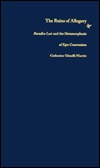

 |

|

Sold Out
Book Categories |
In this reexamination of the allegorical dimensions of Paradise Lost, Catherine Martin presents Milton’s poem as a prophecy foretelling the end of one culture and its replacement by another. She argues that rather than merely extending the allegorical tradition as defined by Augustine, Dante, and Spenser, Milton has written a meta-allegory that stages a confrontation with an allegorical formalism that is either dead or no longer philosophically viable. By both critiquing and recasting the traditional form, Milton describes the transition to a new epoch that promises the possibility of human redemption in history. Martin shows how Paradise Lost, written at the threshold of the enormous imaginative shift that accompanied the Protestant, scientific, and political revolutions of the seventeenth century, conforms to a prophetic baroque model of allegory similar to that outlined by Walter Benjamin. As she demonstrates, Milton’s experimentation with baroque forms radically reformulates classical epic, medieval romance, and Spenserian allegory to allow for both a naturalistic, empirically responsible understanding of the universe and for an infinite and incomprehensible God. In this way, the resulting poetic world of Paradise Lost is like Milton’s God, an allegorical “ruin†in which the divine is preserved but at the price of a loss of certainty. Also, as Martin suggests, the poem affirmatively anticipates modernity by placing the chief hope of human progress in the fully self-authored subject. Maintaining a dialogue with a critical tradition that extends from Johnson and Coleridge to the best contemporary Milton scholarship, Martin sets Paradise Lost in both the early modern and the postmodern worlds. Ruins of Allegory will greatly interest all Milton scholars, as well as students of literary criticism and early modern studies.
Login|Complaints|Blog|Games|Digital Media|Souls|Obituary|Contact Us|FAQ
CAN'T FIND WHAT YOU'RE LOOKING FOR? CLICK HERE!!! X
 You must be logged in to add to WishlistX
 This item is in your Wish ListX
 This item is in your CollectionThe ruins of allegory
X
 This Item is in Your InventoryThe ruins of allegory
X
 You must be logged in to review the productsX
 X
 X

Add The ruins of allegory, , The ruins of allegory to the inventory that you are selling on WonderClubX
 X

Add The ruins of allegory, , The ruins of allegory to your collection on WonderClub |